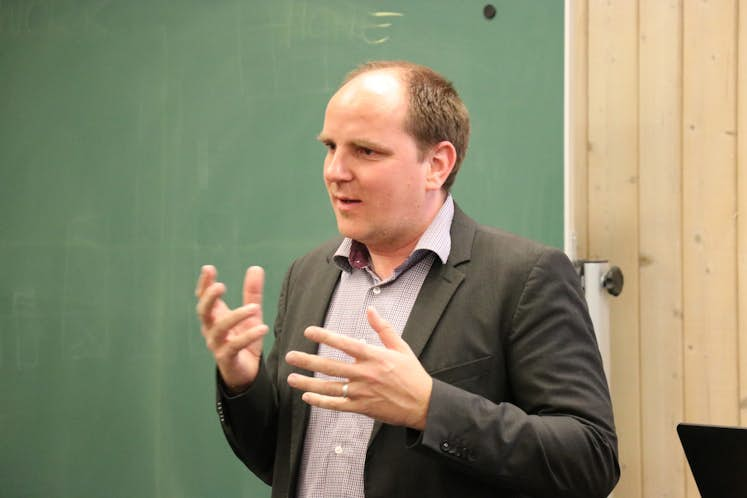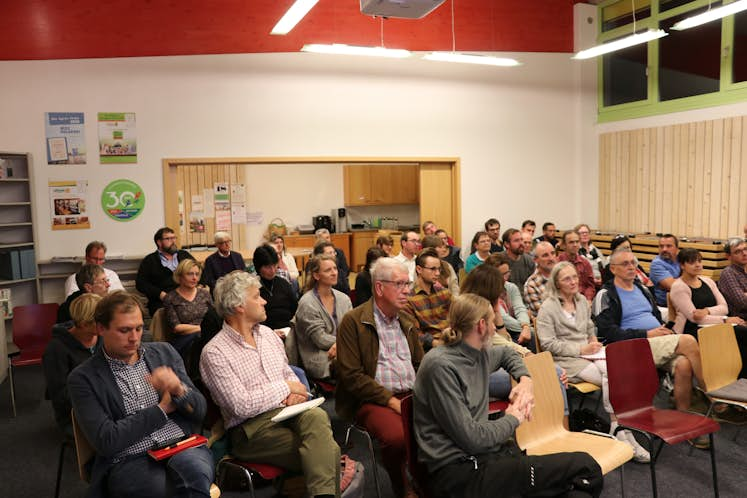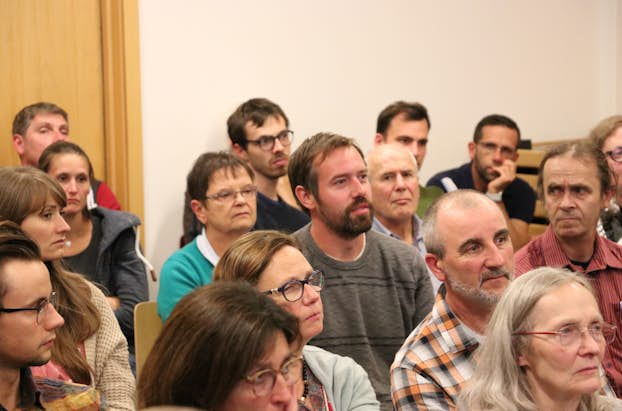- News
“We cannot afford cheap food products!”
On the 18th of September, agricultural scientist and sustainability expert Tobias Bandel from the consulting firm Soil & More was invited as a guest speaker by OIKOPOLIS am Dialog. Mr. Bandel demonstrated the true cost of the food production with practical examples and showed that there is no way around a greening of the agriculture.
Isn’t it nice that our food products are that cheap? Meanwhile the true costs are much higher. These are externalised on the environment, on other countries and on future generations and take form in soil damages, water pollution or health issues. In 2011, the French government calculated in a nationwide study that French consumers pay an additional euro in taxes for the treatment of the, from the agriculture and food industry, polluted water for every euro spend in the supermarket. The result is backed up by various scientific data, such as the one by the Food and Agriculture Organisation of the United Nations (FOA), elevating the true cost of our consumer prices two or three times the level of our actual prices.
In the 70’s, food lifecycle analysts started more and more to mention external costs. Up until today, True Cost Accounting is a well-used tool for the calculation of externalities. In the financial and economic world, Tobias Bandel observes a completely new risk behaviour since many years. Banks, investors, consulting managers and insurers evaluate certain natural capital risks when granting credits and planning investment strategies: they identify the impact of climate change, extreme weather conditions, water shortage and loss of biodiversity on the supply of resources – in monetary terms. Hence, companies are forced to become greener, if they don’t want to lose their credit worthiness or insurance contracts. Through a special full cost calculation, which is partially build on existing and proven sustainability and software tools, Tobias Bandel and his team can determine how costly the business-as-usual scenario of a company can become in the future, or to put it mildly, which economic advantages preventive measures can have.
The agricultural sector is similar. The longer we need to foster sustainability in the agriculture, the higher will be economic, ecologic and social repair costs, explains Bandel. Besides it is already visible that we can no longer afford cheap food. The forecasted numbers from well-known environmental researches and financial institutions speak the same language: in 10 to 15 years already, many food products, especially meat, will become unaffordable for many consumers. This stands in relation to the fact that the agricultural sector is extremely exposed to the risks resulting from climate change and the conventional food industry. About a third of the worldwide agricultural territory has already heavily degraded, which supports the evidence that the conventional agriculture in its current form is not sustainable. There is no way around a greening of the agriculture, which promotes green fertilisers and humus cultivation instead of monocultures and the use of chemicals. New calculations from two Luxemburgish organic farmers demonstrate that organic agriculture can minimise economic risks significantly and can generate a net benefit for the environment and the society.

What can we do?
… Over 60 participants asked themselves this question during the presentation of Mr. Bandel. It is undeniable that the true cost method represents an extremely accurate and extensive base for profound decision-making – but understanding and acting diverge many times. Taking proactive measures is in demand at many levels. For example, the legislator can alter the law in such a way that investments in the natural capital are listed on the assets side of the balance sheet. The retail business can change too, by acting on a supply chain management strategy, which does not transfer the price pressure to the suppliers, but focusses on sustainable trade relations. Hence, corporate risks stemming from natural capital are incorporated. Consumers need to create more awareness that a high amount at the end of their receipt can save a multiple on costs in other parts. They can have an actual impact on their food spending by buying consciously and minimising food waste.
Moreover, multiple indicators can be added to the true cost method. A small glance at the natural capital and its risks and opportunities is not enough. Human- and social capital too have a significant economic impact, which cannot be monetised that easily out of ethical reasons but should nevertheless be considered. This question is a topic for another dialog in the OIKOPOLIS Centre.


